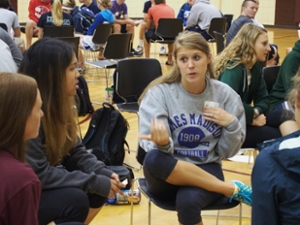Ethical Decision Making Through Recreation
Ethical Reasoning in ActionBy Erin Phillippi ('08M)
Steve Bobbitt, University Recreation’s associate director of programming, understands that UREC is more than just a place to exercise or learn about a new fitness activity. Up to 400 student workers are employed by UREC while over 4,000 students take advantage of the center’s services and programs each day—that makes UREC one of JMU’s most pivotal community spaces. It also makes the facility an ideal location for students to practice their critical thinking and ethical reasoning skills when making decisions.
 During the 2013-14 academic year, Bobbitt applied for a Program Innovation grant from the Madison Collaborative: Ethical Reasoning in Action to investigate ethical reasoning through recreation. In particular, the project focused on conducting workshops and conversations with the 75 student managers at UREC and examining the effects these interventions had on all student workers. The process began in August when the student staffers returned to JMU and participated in two initial workshops, one comparable to the It’s Complicated case study analysis from 1787 Orientation and the other specifically tailored to using the Eight Key Questions in work situations at the recreation center as well as in their personal lives. This conversation continued during the next semester at a January retreat where the student staff members participated in a workshop intended to get them to use the 8KQs to better understand their values and how those values work in action.
During the 2013-14 academic year, Bobbitt applied for a Program Innovation grant from the Madison Collaborative: Ethical Reasoning in Action to investigate ethical reasoning through recreation. In particular, the project focused on conducting workshops and conversations with the 75 student managers at UREC and examining the effects these interventions had on all student workers. The process began in August when the student staffers returned to JMU and participated in two initial workshops, one comparable to the It’s Complicated case study analysis from 1787 Orientation and the other specifically tailored to using the Eight Key Questions in work situations at the recreation center as well as in their personal lives. This conversation continued during the next semester at a January retreat where the student staff members participated in a workshop intended to get them to use the 8KQs to better understand their values and how those values work in action.
The impact these trainings had on the student managers and their employees was assessed using an extensive interview and reflection process that also took place during the spring semester. Each manager was asked to interview four staff members, resulting in an information collection process that connected with over 300 students. The project concluded with reflective meetings that allowed all the student managers to discuss in depth what they had learned about ethical reasoning through the grant program; these meetings included both small and large group discussions focused on specific examples from the academic year in addition to contemplating each Key Question and its applicability to situations found at UREC. Bobbitt concluded the meetings by asking students to look ahead and plan out future steps to make the Eight Key Questions and ethical reasoning an essential part of programming at the recreation center.
After processing the entire experience and connecting it to an exercise for an English class, a student who participated in UREC’s program noted that “The whole message of the training exercise was to show that the principle of solving problems using ethical based reasoning will lead to a solution, no matter how large or small the problem is.”
Having already presented some of his initial findings at professional workshops, Bobbitt seeks to continue his work by presenting more of his program research at regional and national recreation conferences around the country. He’s also hoping to pursue additional grants so that he can explore this subject in more depth with future students. The program will continue to develop during the 2014-15 academic year as Bobbitt strives to refine the implementation and assessment processes. While the program becomes more essential to University Recreation and its staff, all students will benefit from its’ commitment to strengthening the culture of ethical thinking at JMU.

